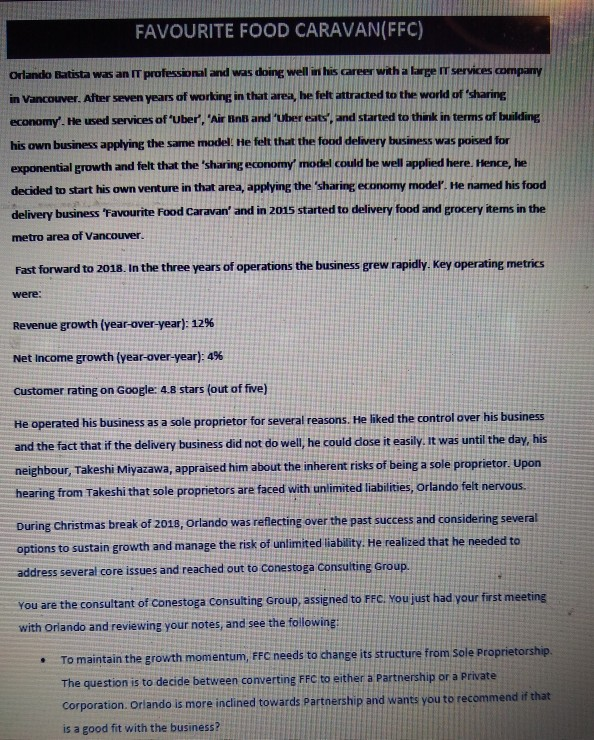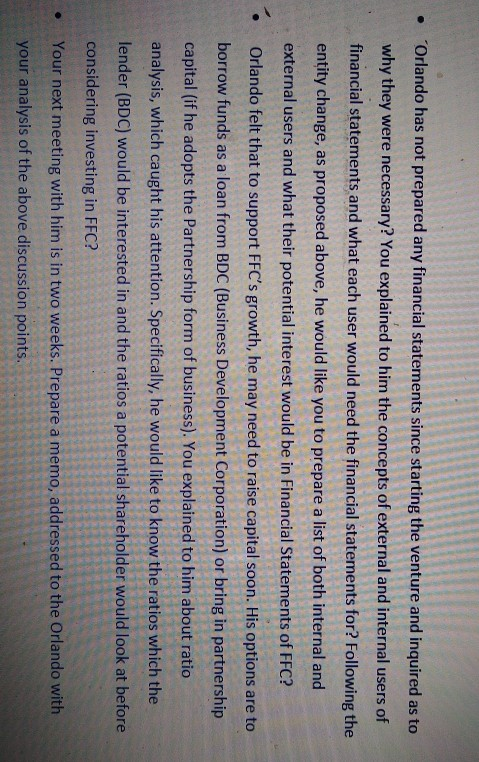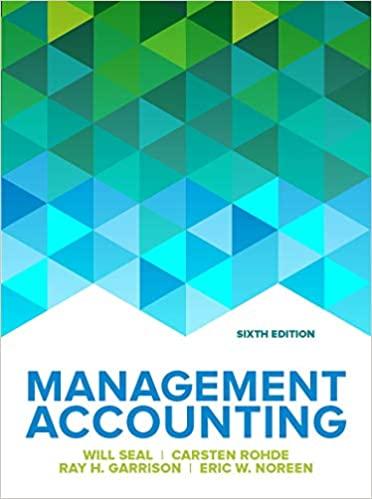Answered step by step
Verified Expert Solution
Question
1 Approved Answer
FAVOURITE FOOD CARAVAN(FFC) Orlando Batista was an IT professional and was doing well in his career with a large IT services company in Vancouver. After


FAVOURITE FOOD CARAVAN(FFC) Orlando Batista was an IT professional and was doing well in his career with a large IT services company in Vancouver. After seven years of working in that area, he felt attracted to the world of 'sharing economy'. He used services of 'Uber', 'Air Bn and 'Uber eats, and started to think in terms of building his own business applying the same model. He felt that the food delivery business was poised for exponential growth and felt that the 'sharing economy' model could be well applied here. Hence, he decided to start his own venture in that area, applying the 'sharing economy model. He named his food delivery business 'Favourite Food Caravan' and in 2015 started to delivery food and grocery items in the metro area of Vancouver. Fast forward to 2018. In the three years of operations the business grew rapidly. Key operating metrics were: Revenue growth (year-over-year): 12% Net Income growth (year-over-year): 4% Customer rating on Google: 4.8 stars (out of five) He operated his business as a sole proprietor for several reasons. He liked the control over his business and the fact that if the delivery business did not do well, he could dose it easily. It was until the day, his neighbour, Takeshi Miyazawa, appraised him about the inherent risks of being a sole proprietor. Upon hearing from Takeshi that sole proprietors are faced with unlimited liabilities, Orlando felt nervous. During Christmas break of 2018, Orlando was reflecting over the past success and considering several options to sustain growth and manage the risk of unlimited liability. He realized that he needed to address several core issues and reached out to Conestoga Consulting Group. You are the consultant of Conestoga Consulting Group, assigned to FFC. You just had your first meeting with Orlando and reviewing your notes, and see the following: To maintain the growth momentum, FFC needs to change its structure from Sole Proprietorship. The question is to decide between converting FFC to either a Partnership or a Private Corporation. Orlando is more inclined towards Partnership and wants you to recommend if that is a good fit with the business? Orlando has not prepared any financial statements since starting the venture and inquired as to why they were necessary? You explained to him the concepts of external and internal users of financial statements and what each user would need the financial statements for? Following the entity change, as proposed above, he would like you to prepare a list of both internal and external users and what their potential interest would be in Financial Statements of FFC? . Orlando felt that to support FFC's growth, he may need to raise capital soon. His options are to borrow funds as a loan from BDC (Business Development Corporation) or bring in partnership capital (if he adopts the Partnership form of business). You explained to him about ratio analysis, which caught his attention. Specifically, he would like to know the ratios which the lender (BDC) would be interested in and the ratios a potential shareholder would look at before considering investing in FFC? Your next meeting with him is in two weeks. Prepare a memo, addressed to the Orlando with your analysis of the above discussion points. FAVOURITE FOOD CARAVAN(FFC) Orlando Batista was an IT professional and was doing well in his career with a large IT services company in Vancouver. After seven years of working in that area, he felt attracted to the world of 'sharing economy'. He used services of 'Uber', 'Air Bn and 'Uber eats, and started to think in terms of building his own business applying the same model. He felt that the food delivery business was poised for exponential growth and felt that the 'sharing economy' model could be well applied here. Hence, he decided to start his own venture in that area, applying the 'sharing economy model. He named his food delivery business 'Favourite Food Caravan' and in 2015 started to delivery food and grocery items in the metro area of Vancouver. Fast forward to 2018. In the three years of operations the business grew rapidly. Key operating metrics were: Revenue growth (year-over-year): 12% Net Income growth (year-over-year): 4% Customer rating on Google: 4.8 stars (out of five) He operated his business as a sole proprietor for several reasons. He liked the control over his business and the fact that if the delivery business did not do well, he could dose it easily. It was until the day, his neighbour, Takeshi Miyazawa, appraised him about the inherent risks of being a sole proprietor. Upon hearing from Takeshi that sole proprietors are faced with unlimited liabilities, Orlando felt nervous. During Christmas break of 2018, Orlando was reflecting over the past success and considering several options to sustain growth and manage the risk of unlimited liability. He realized that he needed to address several core issues and reached out to Conestoga Consulting Group. You are the consultant of Conestoga Consulting Group, assigned to FFC. You just had your first meeting with Orlando and reviewing your notes, and see the following: To maintain the growth momentum, FFC needs to change its structure from Sole Proprietorship. The question is to decide between converting FFC to either a Partnership or a Private Corporation. Orlando is more inclined towards Partnership and wants you to recommend if that is a good fit with the business? Orlando has not prepared any financial statements since starting the venture and inquired as to why they were necessary? You explained to him the concepts of external and internal users of financial statements and what each user would need the financial statements for? Following the entity change, as proposed above, he would like you to prepare a list of both internal and external users and what their potential interest would be in Financial Statements of FFC? . Orlando felt that to support FFC's growth, he may need to raise capital soon. His options are to borrow funds as a loan from BDC (Business Development Corporation) or bring in partnership capital (if he adopts the Partnership form of business). You explained to him about ratio analysis, which caught his attention. Specifically, he would like to know the ratios which the lender (BDC) would be interested in and the ratios a potential shareholder would look at before considering investing in FFC? Your next meeting with him is in two weeks. Prepare a memo, addressed to the Orlando with your analysis of the above discussion points
Step by Step Solution
There are 3 Steps involved in it
Step: 1

Get Instant Access to Expert-Tailored Solutions
See step-by-step solutions with expert insights and AI powered tools for academic success
Step: 2

Step: 3

Ace Your Homework with AI
Get the answers you need in no time with our AI-driven, step-by-step assistance
Get Started


